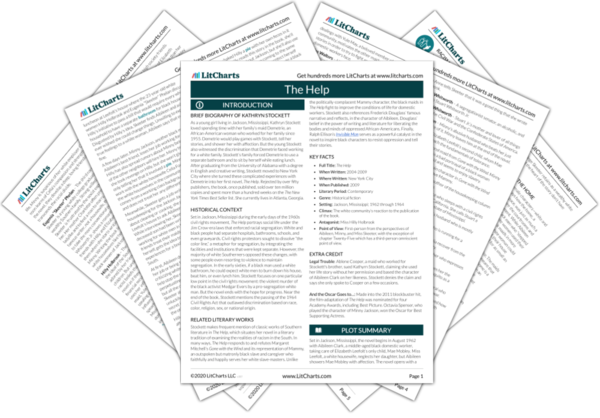Summary
Analysis
At the home that Skeeter shares with her parents, the family doctor informs her that Charlotte has cancer in her stomach lining. The doctor says her mother has two months to live. Skeeter’s father consoles her as she cries. A couple of days later, Stuart drops by again on Christmas day to try and talk with Skeeter again. Skeeter lets him kiss her, saying it’s only because her mother is dying.
With her mother dying, Skeeter doesn’t seem to think it worthwhile to hold a grudge over what happened with Constantine. She does not forgive her mother, but she also does not reject Charlotte in her time of need.
Themes
Over the next few weeks, Stuart and Skeeter start seeing each again. Sometimes they go out to dinner, but they usually just talk and watch television together at Skeeter’s home so that Skeeter can be close to her ailing mother. One night while they are watching TV, Stuart mentions that Hilly is spreading rumors that Skeeter is “some kind of crazy liberal” who wants integration. Stuart says he knows it’s all lies because Skeeter’s “too smart to get mixed up in anything like that.” Feeling guilty that she has kept the truth about her book a secret from him, Skeeter just nods and smiles.
Stuart’s defense of Skeeter is an example of dramatic irony, which is when the reader knows something – in this case, that Skeeter’s book might help the integrationist movement – that a character (Stuart) does not. Skeeter also seems hypocritical here, since she kept her book a secret from Stuart, even though she demanded he come clean about what happened with Patricia.
Themes
One day, in preparation for a date with Stuart, Skeeter buys some modern woman’s clothing with short hemlines. Stuart takes her to the fanciest restaurant in town. While they eat, Stuart comments that she looks “different” and says that her dress is “so…short.” Skeeter thinks that he seems more confused with her new look than impressed.
At the Benefit Johnny complimented Celia even though her outfit clashed with high society conventions, showing that he was supportive of her no matter what. Stuart, in contrast, implicitly criticizes Skeeter for her outfit, effectively shaming Skeeter into conforming to a more conventional dress code.
Themes
After they finish eating, Skeeter notices that Stuart’s parents are at the restaurant bar having drinks. She asks if they should go over to say hello, but Stuart directs her away from his parents because he’s afraid of what his mother, Francine, will think about her dress. Skeeter feels hurt that he’s ashamed of her.
Stuart once again shames Skeeter by directing her away from his parents, showing that he is more concerned with how his parents – politically conservative guardians of the status quo – will see him than about the feelings of the woman he supposedly loves.
Themes
Get the entire The Help LitChart as a printable PDF.

It’s past eleven when they arrive back at Skeeter’s home. Stuart walks her to the door and then holds out a ring and asks her to marry him. Smiling while on the verge of tears, Skeeter says yes, but that she needs to tell him a secret first. She tells him everything about the book except the names of the maids who participated. Confused about why she’s writing the book, he asks why she even cares about the maids. Skeeter flinches at his ignorance and looks down at the ring again. It looks “sharp and shiny” now.
Since the previous passages demonstrated that Stuart cares deeply about societal conventions, it is unsurprising that Stuart doesn’t understand why Skeeter would so brazenly disobey the most important taboo in Southern white communities: do not cross the color line. No longer excited by the proposal, Skeeter thinks the ring looks “sharp,” as if it, and the commitment to marriage it represents, were a weapon of oppression.
Themes
Stuart says that everything is fine in Mississippi and that Skeeter shouldn’t “go stirring up trouble.” Skeeter sympathizes with Stuart’s inability to see the grim truth about how bad things are in Mississippi for black people. When Skeeter says that she’s not stirring up trouble because trouble is already here, Stuart takes back his proposal, saying that he can’t marry someone he doesn’t know. Still loyal to her, he promises to keep the book a secret.
In mid-January, 1964, Skeeter meets with Minny and Aibileen at Aibileen’s house and tells them that Elaine Stein just called. Her publishing house will release a few thousand copies of the book and pay them eight hundred dollars total. It’s not a lot of money spread between all the maids, but Aibileen and Minny are ecstatic. The book will be published in August.
Aibileen and Minny’s ecstatic excitement shows that they did not contribute to the book for the self-serving reasons of fame or wealth. Instead, they did so in order to tell the world the truth about life for a black woman in Jackson.
Themes












